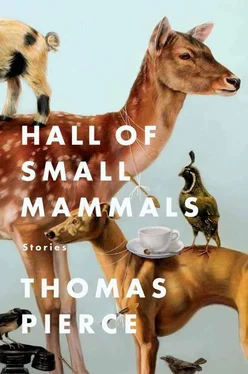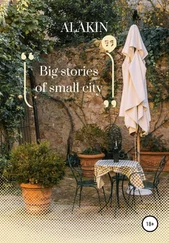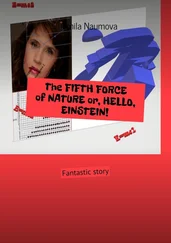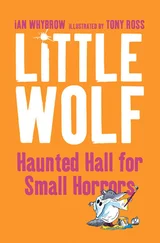“Don’t be afraid,” Mrs. Ash says, head turned back. “You can do it, Hank. Remember how it starts? With us turning on the sprinkler?”
The boy throws his stick into the woods, eyes still on his feet.
“Hank,” Mr. Ash says, clearly irritated. “Hank, your mother and Grammy are talking to you.”
“It’s okay,” Felix says, suddenly aware of all those eyes sharply focused on his little boy. He imagines Hank, half asleep, being led downstairs night after night to a room full of strange squawking dinner guests, all of them demanding he tell the one about the frog and the sprinkler. He imagines these people laughing, and Hank not knowing what it was he said, exactly said, that made them laugh so much. Even if it was the funniest frog story since Mark Twain’s jumping frog, Felix does not want Hank to have to tell it against his will. “Leave him be.”
“But I want you to hear it,” Bet says. They’ve stopped walking now. Through the trees other backyards are visible — trampolines and garden beds, a swimming pool.
“Hank, no one is forcing you to tell the story,” Felix says, leaning toward his son, whose eyes are still trained downward. “It’s totally up to you. Maybe later you’ll want to tell me, or maybe you won’t. Either way is fine. Okay, buddy?”
“Remember what happened when the frog landed on the sprinkler?” JT asks. “What happened when we—”
“Drop it,” Felix says, looking hard at JT. “Didn’t you hear me? Lay off him. Can’t you see he doesn’t want to tell it?”
“All right, calm down, no need to be an ass about it, Felix,” Mr. Ash says.
Felix digs the heel of his shoe into the dirt. Here it comes: the wrong thing, welling up in him. “Nick, if I want your opinion, I’ll ask for it.”
“Enough,” Mr. Ash says.
“Enough what?”
“Enough everything.”
“Does anyone know the story about the old man’s asshole and the sprinkler?” Felix asks. “’Cause that’s a really good one.”
“Not appropriate,” Bet says.
“You don’t have to be here, Felix,” Mr. Ash says. “No one said you had to come this weekend. You chose to come.”
“Daddy, that’s not going to help anything,” Bet says.
“Yes, Daddy, you’re not helping,” Felix says.
“Felix,” Laura whispers. “Stop.”
Hank looks at all of them, confused. Felix pivots and starts back for the house. They aren’t far from the house, maybe three hundred yards. He can feel their eyes on his back. Along the trail, at the top of long metal poles, are wooden bird boxes. If he shook one, would a bird fly out? Only now does he remember that he has no rental car back at the house in which to make his retreat. He’ll have to wait for someone to give him a lift back to the hotel. More than anything he does not want to turn back around and ask to borrow a car. The ability to run away: it’s part of what makes one an adult. Laura catches up with him, her eyes wide.
“I apologized for you,” she says.
“I didn’t want to apologize.”
“Never hurts to apologize.”
They walk fast over the trail and then turn left into the Ashes’ backyard. If he continued walking, maybe Laura would agree to wait and ask to borrow a car. She could pick him up down the road.
But Hank. Shit, he never said goodbye to Hank. He could leave something for the boy, a gift of some kind, something that would communicate how sorry he is for bailing like this. He fishes around in his pockets and finds his keys. On the ring he has a small metal hamster trinket, a gift from the network when the show started its second season. Felix spots the treehouse. He could hide it for him up there, as a surprise. The rope ladder stretches when he steps onto the bottom rung, bringing it all the way to the ground. It bucks as he climbs, his feet swinging ahead of him.
“What are you doing?” Laura asks.
“Just give me a minute,” he says, head and shoulders through the opening now. He barely fits. When his butt clears the jagged and splintery circle, he sits back and admires the new view of the yard. Laura looks up at him, her arms crossed like a none-too-satisfied audience member. Spread across the platform are the corpses of mangled action figures. A small white bucket near one of the tree ballasts contains a dozen rotten crab apples. Felix doesn’t have any paper for a note. He takes out a pen and looks for a suitable place to write a message.
“You don’t have to go.” It’s Bet, calling up to him. She’s standing beside Laura on the ground. “If you really want to, I’ll take you. But I think for Hank’s sake you should both stay. But Felix, please, take a walk or something. Get yourself together. You’ve been acting strange ever since you got here. And what’s this about the rubber snakes?”
So JT told her. That makes sense. They are together now, a real couple, and naturally they will share such information. They will talk about people, judge them. Felix is one of those people. He is someone for them to discuss, to judge.
“I don’t think Felix meant anything by the snakes,” Laura says to Bet.
“JT was pretty sure Felix was calling him”—her voice drops to a whisper—“a racist.”
“It wasn’t like that,” Laura says. “Not exactly. Don’t get me wrong, I’m not excusing Felix. You’re right. It was very poorly put.”
Felix watches them talk.
“I’m sorry about the snake thing,” he says. “I am. And yes, you’re right, we should probably stay. For Hank. I can hang up here for a while and cool off. Go eat dinner. I’ll eat mine up here. I’ll come in for dessert. What’s for dessert? It’s not your mother’s pecan pie, is it?”
He begins etching Hank’s name into the wood beside his knee. He has to drag the pen back and forth, against the grain, to make the ink visible. The others emerge from the woods, and Bet tells them all to go inside and wait there.
“You should send him packing,” Mr. Ash says quietly, though not inaudibly, to his daughter before Mrs. Ash drags him off toward the house.
“Sorry about the snake thing,” Felix says as JT passes.
“All right,” JT says, and keeps walking.
The rope ladder shakes. A small head emerges. It’s Hank — small, wonderful Hank up in the treehouse — the red tights stretched thin and transparent at the knees and toes, a somber expression on his face.
“What’s up, buddy?” Felix asks. “I’m not leaving. Don’t worry. The adults were just having… an adult moment.”
Hank gazes down at the half-finished H in the wood beside Felix’s knee.
“The frog,” Hank says, and sighs deeply. “It died.”
Felix smiles. He can’t help it.
“Honey, that’s not the best way to tell the story,” Bet says, from below, and then appeals to Felix. “I mean, the frog did die, he’s right, but it’s not as bad as all that. The other way he tells it is actually funny.”
But it is funny. Can’t they see that? That no one is laughing is proof of that. It is beyond laughter. The frog died. Bah-dah-dum. End of frog. Oh, shit. Oh, God. Oh, flaps: Which was it for the frog? The boy looks up at him thoughtfully, with what Felix wants to interpret as an expression of mutual understanding. He stands and lifts his son off the platform into a high, soaring hug. “You told it perfect,” Felix says. “I’ll bet that frog never saw it coming.”
Hank’s little arms give Felix a squeeze. The boy’s red legs dangle loose at first but then begin bicycling wildly, ready to touch back down on the platform. “Let go,” Hank says, squirming, but Felix resists. He’s not ready to let go just yet. If he does, those little red feet might carry the boy away at a tremendous speed. Laura and Bet watch from below. Bet has her hands out like she thinks Hank and Felix might both come tumbling down off the platform. “Careful,” she says. “Please.”
Читать дальше












